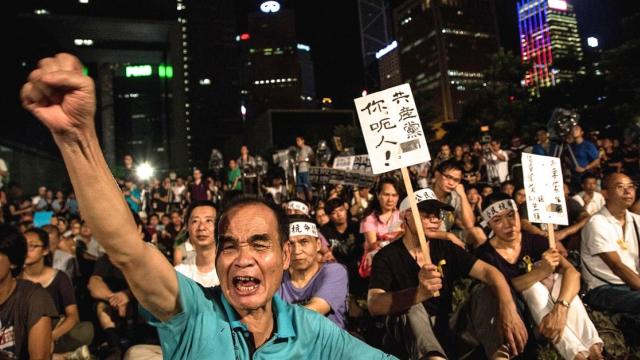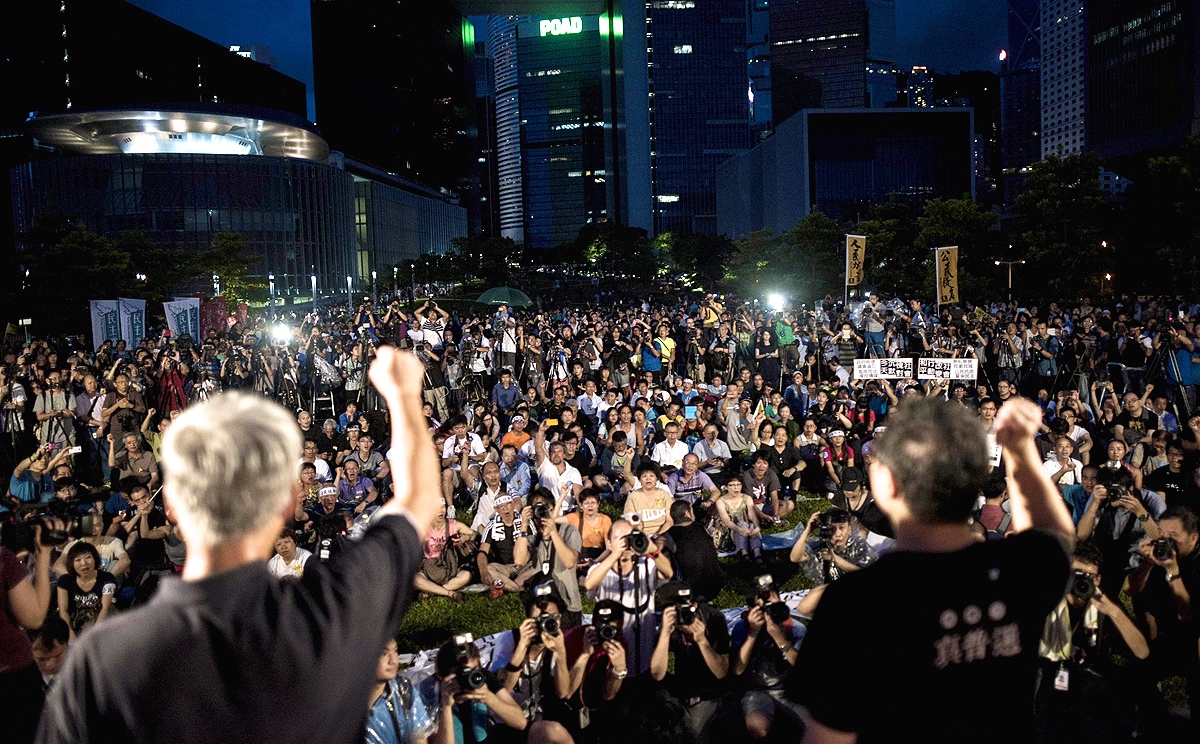
Tensions are high in Hong Kong amid a row about how the city's leader should be elected. Elections are due in 2017, but the Chinese government has issued a ruling limiting who can stand as a candidate. Democracy campaigners are planning to occupy the city's business district in protest – a move denounced by China. The BBC explains the movement.
What does Occupy Central want?
Occupy Central with Love and Peace, known as Occupy Central, is a civil disobedience movement proposed by democracy activists in Hong Kong.
The campaigners want political reform and democratic elections that meet international standards. They are planning a non-violent occupation of the business district, Central, in response to the Chinese government's ruling against open elections in 2017.
They have said they can mobilize 10,000 in the first phase of the sit-in. The campaign takes its name from the U.S.'s Occupy Wall Street movement against social inequality in 2011.
Hong Kong is under Chinese rule – can protests realistically make a difference?
Even the movement's organizers admit that Occupy Central is highly unlikely to sway the Chinese government.
However, public protests play an important role in Hong Kong. Locals have free speech and the right to protest, but cannot directly elect their government. Many see taking to the streets as their way of forcing change.
Some demonstrations have succeeded. A controversial national security law known as Article 23 was proposed in 2002, but dropped after large protests. The government also backed down over "patriotic education" classes following rallies against the move.
Occupy Central's demands, however, are more sensitive. Demanding full democracy would radically change how Hong Kong is governed, and Beijing would view it as a direct challenge to its own authority.
Could there be violence?
Organizers insist Occupy Central will be non-violent. Rallies frequently take place in Hong Kong, and are generally peaceful and well-organized.
But protests have become more confrontational over the years, as Hong Kong's politics have become polarized. In recent years, there have been some clashes between pro-democracy and pro-Beijing demonstrators. Protesters have attempted to storm government buildings.
In July, 500 people were arrested for illegal assembly after staging a pro-democracy sit-in that was viewed as a rehearsal for Occupy Central. The protest was non-violent, although some people sustained light injuries when police removed them from the site.
Some critics are concerned the organizers will not be able to control the crowd.
What do Hong Kong people think?
There is a large spectrum of opinion. Protests organized by pro-democracy activists, and pro-government groups, have both drawn tens of thousands – although pro-government protests are less common, and local media have reported that some people were paid to attend.
Hong Kong is a business-minded city, and many will be reluctant to take part in civil disobedience, or anger Beijing, fearing it could hurt the economy. Some argue that law-makers should accept China's proposal as the pragmatic option.
However, a significant number of people do want more democracy, and have expressed anger at the China's ruling, arguing that it offers no real choice.
Who are the key players?
The main organizers supporting the movement are Benny Tai, a law professor, Chan Kin-man, a sociology professor and Chu Yiu-ming, a church minister. They are regarded as comparatively moderate pro-democracy figures.
The movement is supported by many political parties in Hong Kong's pan-democratic camp, as well as student groups. The supporters have not always been united - some had urged softer reforms less likely to antagonize Beijing.
However, China's ruling now appears to have united many supporters, who have described the restrictions on who can stand as a candidate as undemocratic and unacceptable.
Key players against the movement include mainland China and Hong Kong government officials, who have spoken out againstOccupy Central.
Pro-Beijing and pro-business parties tend to be against the campaign, and several anti-Occupy Central groups have also been set up.
What is China worried about?
The Chinese Communist Party does not want any movement that could be perceived as a challenge to its authority. President Xi Jinping has consolidated power since taking office in 2013, and appears to have adopted a harder line against dissent.
China has been concerned by growing political tensions and anti-mainland-Chinese sentiment in Hong Kong. State media have accused "external forces" of meddling in Hong Kong's affairs and encouraging "separatist sentiments".
There has been speculation over whether China would get involved in a crackdown on Occupy Central, if it is not satisfied with how it is handled by local authorities. However, it is thought that China would view this as an absolute last resort, given the likely international and business repercussions.
What happens next?
Organizers say plans for the sit-in will be announced over the coming weeks. The Hong Kong Federation of Students is organizing a week-long boycott of classes in protest against China's ruling. Several universities have indicated that students will not be penalized for missing classes or taking part in Occupy Central.
To enable direct elections in 2017, the Hong Kong government will have to present a political reform plan to Hong Kong's law-making body, the Legislative Council, for a vote. Pro-democracy law-makers, who hold enough seats for a veto, have said that they will vote down any proposal based on China's ruling.
If the proposal is voted down, Hong Kong will be unable to implement universal suffrage, and its elections are expected to proceed as before, with a committee of 1,200 mostly pro-Beijing figures selecting the leader.
3 WAYS TO SHOW YOUR SUPPORT
- Log in to post comments












